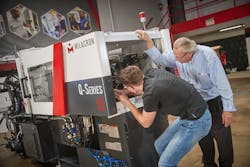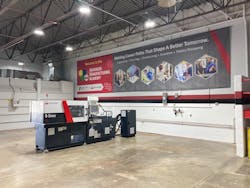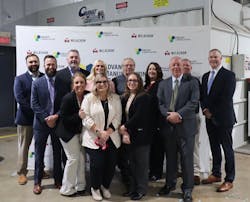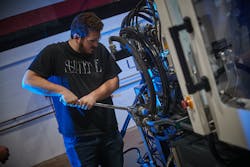Milacron's high school academy trains next generation of workers
By Karen Hanna
For someone his age, high school senior Jhace Pryor probably knows more than most of his peers about plastics. But just a few weeks into a training program sponsored by Milacron, he has one insight even industry veterans would echo:
“You always seem to be learning something in this field,” the 17-year-old said in an email to Plastics Machinery & Manufacturing on Oct. 19, just one day before an official ribbon-cutting ceremony celebrating the opening of the Milacron Advanced Manufacturing Academy (AMA).
Amid the labor crisis precipitated by the COVID-19 pandemic and the exodus of baby boomers from the workforce, the academy is one way Milacron hopes to ensure it has skilled workers to build injection molding, extrusion and auxiliary equipment into the future.
“The ultimate goal of this academy program is to provide hands-on manufacturing experience for students that delivers relevant real-world support of their future career decisions. Students of our program will have an opportunity for work placement that can lead to full-time employment within Milacron’s manufacturing operations function,” said Lindsay Niedzwiedski, the lean enterprise leader for the Hillenbrand Operating Model — a business approach implemented across the brands owned by Milacron’s parent company, Hillenbrand, Batesville, Ind.
Learning by doing
Job opportunities in manufacturing attracted Pryor and classmate Jaxson Rhodes to pursue slots within the academy after participating in other vocational programs at Grant Career Center during their junior year. For them — and Milacron — the program is a win-win.
“A career in manufacturing is often seen as working in a dimly lit factory, but that is far from the case today,” said Rhodes, also 17. “I am interested in a manufacturing career because nearly anything you use every day was made from some machine that was created on a shop floor, being your cars or the phones you use every day.”
Niedzwiedski, who works with the program to ensure lean principles are woven into the curriculum, describes it as “rigorous, but fulfilling and very functional for post-graduate application.”
With one grading quarter of classes already in the books, Rhodes and Pryor both valued the program’s hands-on opportunities. Among other topics, they’ve learned about draining and refilling oil reservoirs, torque specifications and wiring heater bands.
So far, it’s exceeded Pryor’s expectations. He’s looking forward to what comes next, if he’s successful in the program.
“I chose the program due to the benefits (tuition reimbursement, vacations and paid sick days, along with overtime) that Milacron has to offer and its worldwide networking which offers great opportunities to travel; also I figured that if I joined AMA it would put me ahead of the game,” he said in his email. “Also, I’ve been a very hands-on type of person so getting to work on a machine is really nice and you’re learning a lot of cool and interesting information.”
Along with supplying instructors for the program, Milacron has provided plastics processing equipment, including a Q-series injection molding machine.
Getting set up
The AMA, which played host to numerous state and local dignitaries on Oct. 20 as part of its grand opening, represents the complementary vision of its sponsors, the GCC and Milacron.
“The Advanced Manufacturing Academy germinated from a conversation at GCC’s Business Advisory Council (BAC) meeting following the disruption of the COVID-19 pandemic,” Parry said. “Milacron, an important member of the BAC, mentioned a need to develop/redevelop a training model to overcome the personnel challenges made clear by the pandemic.”
Discussions heated up when space opened in the GCC more than a year ago, Niedzwiedski said.
Milacron sees the academy as both a way to build its own bench, and to prepare people for careers in manufacturing jobs in general, she said.
She said the program’s content is geared toward Milacron’s needs, but the skills students pick up would be transferrable to other kinds of manufacturers.
“We know this partnership and initiative has endless opportunities for students, as well as adults, in our current and neighboring communities,” Niedzwiedski said.
“The possibility of being hired by Milacron was taken into account on my decision to join the Advanced Manufacturing Academy,” Rhodes said, “but wasn’t the only reason for joining as getting job training during school hours that can be used in nearly any manufacturing environment would be hard to pass on.”
Along with the AMA, the GCC offers 12 workforce development programs to interested high school juniors and seniors. Prior to their senior year, students in the AMA had been involved in the GCC’s Industrial Academy and metal fabrication, information technology, automotive technology and construction technology programs.
Students who perform well this year in the AMA could land jobs at one of two nearby Milacron facilities, Niedzwiedski said.
“Employment is not guaranteed with participation in the program,” she said. “The students are evaluated many times during the academy. The evaluation focuses on behavior characteristics such as communication, organization/ time management, leadership and interpersonal skills. Technical knowledge and skill is also evaluated, but we know that behavior characteristics are stronger indicators of high-potential employees.”
Launching into the future
Of the GCC’s vocational programs, which take two years starting in students’ junior year, the AMA is unique, in that so far it’s only open to seniors. But the future — for both the program and its participants — could offer so much more.
Milacron and the GCC, for example, look forward to expanding on the AMA to reach out to adult learners.
“An employee upscaling programming will be added to the AMA, allowing current Milacron employees to grow skills, certifications and credits,” Parry said. “To implement the upscaling program, a college partner will need to be added.”
He said he anticipates more employers signing on to help with the program, in addition to Milacron, but expansion will require more equipment.
The AMA offers a good opportunity, Rhodes and Pryor said.
“The possibility of joining Milacron through this program is huge, it’s a very good work environment over at the plant and the coworkers seem very happy about their jobs at Milacron,” Pryor said in his email.
Contact:
Milacron LLC, Batavia, Ohio, 513-536-2000, www.milacron.com
About the Author
Karen Hanna
Senior Staff Reporter
Senior Staff Reporter Karen Hanna covers injection molding, molds and tooling, processors, workforce and other topics, and writes features including In Other Words and Problem Solved for Plastics Machinery & Manufacturing, Plastics Recycling and The Journal of Blow Molding. She has more than 15 years of experience in daily and magazine journalism.



